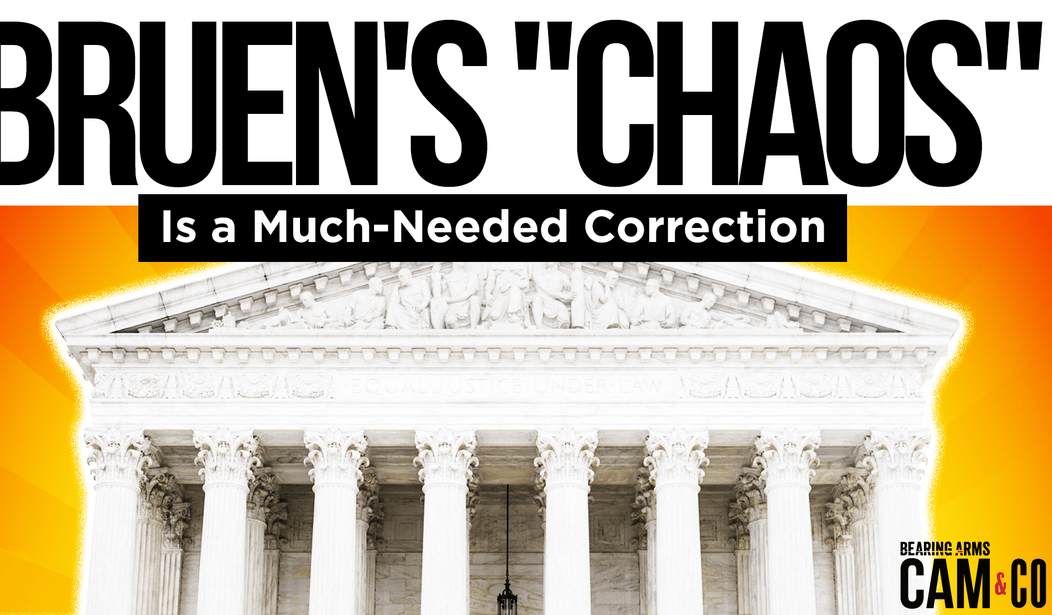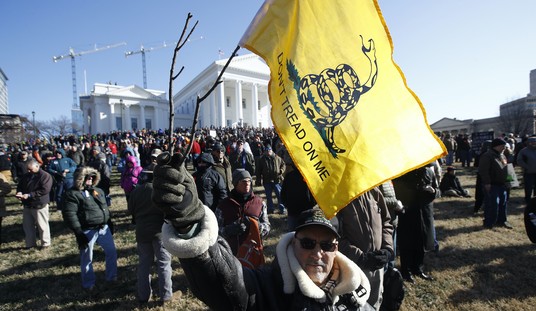Ahead of four decisions on California gun laws that are expected to soon be released by U.S. District Judge Roger Benitez, the Los Angeles Times is advancing the narrative that the Supreme Court’s Bruen decision is sowing “chaos” in the courts. But as we discuss on today’s Bearing Arms’ Cam & Co, upending the untenable status quo is a good thing, particular given how the judiciary has abused “interest balancing” tests to regularly uphold infringements on a fundamental right.
Reporter Kevin Rector’s coverage of how the courts have dealt with the Supreme Court’s edict that those interest balancing tests are inappropriate is clearly slanted; not only in the front-page story itself, but he promoted his piece on social media.
“Instead of having a reasonable debate over whether a ban on assault weapons is good policy or not, we have to debate whether a ban on assault weapons has historical antecedents.”
“It’s all about the absurdity of originalism.”
Read my story here: https://t.co/cPCGfbVZGS
— Kevin Rector (@kevrector) March 7, 2023
Yes, SCOTUS has rejected the interest-balancing tests that many lower courts adopted after the Heller decision in 2008, but as Justice Clarence Thomas made clear in Bruen, that was never the appropriate test when it comes to gun control laws”
Since Heller and McDonald, the Courts of Appeals have developed a “two-step” framework for analyzing Second Amendment challenges that combines history with means-end scrutiny. The Court rejects that two-part approach as having one step too many. Step one is broadly consistent with Heller, which demands a test rooted in the Second Amendment’s text, as informed by history. But Heller and McDonald do not support a second step that applies means-end scrutiny in the Second Amendment context. Heller’s methodology centered on constitutional text and history. It did not invoke any means-end test such as strict or intermediate scrutiny, and it expressly rejected any interest-balancing inquiry akin to intermediate scrutiny.
What Rector (and the vast majority of the sources he spoke to) object to is the fact that the Court’s explicit instructions to discard those interest-balancing tests in favor of a text, history, and tradition test puts laws like California’s ban on so-called assault weapons on shaky legal ground. No longer can the courts decide that even though a particular gun control law intrudes on the Second Amendment rights of citizens, it’s okay because the government has an interest in promoting public safety. Now those laws must be justified through the historical record; something that is going to be difficult given that the gun control movement is a fairly modern creation.
“This new ‘history and tradition’ test that the Supreme Court established last June is wreaking havoc on America’s gun laws,” said Adam Winkler, a UCLA law professor who focuses on 2nd Amendment law. “Instead of having a reasonable debate over whether a ban on assault weapons is good policy or not, we have to debate whether a ban on assault weapons has historical antecedents.”
With all due respect to Winkler, the courts aren’t the right venue for a “reasonable debate” on the policy of a gun ban. Legislators can and will continue to debate banning “assault weapons”, but it’s up to the judiciary to determine if those laws are constitutionally sound. And as much as the law professor complains that Bruen is wreaking havoc on gun laws, I’d argue that when appellate courts like the Ninth Circuit refuse to ever find a gun control law unconstitutional the judiciary is wreaking havoc on a fundamental civil right.
The Bruen decision will not lead to every gun control law being overturned, as disappointing as that might be for Second Amendment advocates. Heck, the Court said that “shall issue” concealed carry regimes are presumptively constitutional, and the justices pointed to places like schools, legislative assemblies, and polling places as locations that could likely be labeled “sensitive places” without much legal trouble. But the Court’s opinion should also take an “assault weapons” ban and many other modern inventions of the gun control lobby off the table, at least if judges are willing to abide by what SCOTUS had to say.
As we’ve seen in places like Oregon, though, some judges are still finding new and creative ways to uphold gun control laws by stretching the boundaries of an historical analogue beyond credulity. Bruen may have put the lower courts on notice, but as valuable a course correction on Second Amendment jurisprudence as it might be, it can’t and won’t be the last word for the Court on our right to keep and bear arms.








Join the conversation as a VIP Member